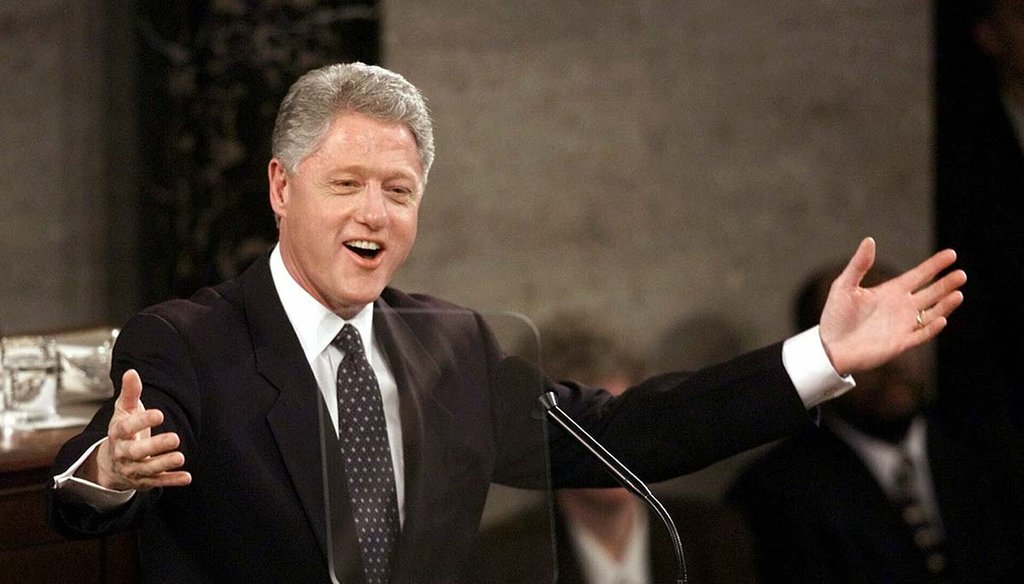Stand up for the facts!
Our only agenda is to publish the truth so you can be an informed participant in democracy.
We need your help.
I would like to contribute

President Bill Clinton gestures while giving his State of the Union address Jan. 19, 1999, on Capitol Hill in Washington. (AP)
If Your Time is short
-
President Bill Clinton was interviewed by a historian while he was in office. Clinton kept the audiotapes in his sock drawer.
-
Judicial Watch, a conservative group, asked the court in 2010 to declare the tapes presidential records under the Presidential Records Act. The group wanted the National Archives to assume custody of the tapes and put them in the Clinton presidential library.
-
U.S. District Court Judge Amy Berman Jackson ruled against Judicial Watch. She wrote that the act distinguishes official presidential records from personal records.
As former President Donald Trump defended himself against federal charges involving classified documents, he described what sounded like a case of political hypocrisy.
President Bill Clinton kept audiotapes in a sock drawer and a court said it was OK, Trump said a day after being indicted on federal charges that he mishandled classified documents.
"They also don't mention the defining lawsuit brought against Bill Clinton," he told a Columbus, Georgia, crowd June 10, "and it was lost by the government — the famous socks case that says he can keep his documents. They don't mention that. These are minor details. And that’s the ruling law."
Trump has commented about the so-called Clinton socks case for months, recently writing on his social media platform, Truth Social, "Under the Presidential Records Act, I’m allowed to do all this. Under the Clinton socks case, the decision is clear."
Trump’s description distorts the facts. The case was not "lost by the government" — the government didn’t file the case — it was filed by a private group, Judicial Watch.
Sign up for PolitiFact texts
But Trump is making a faulty comparison. The judicial ruling in the Clinton socks case does not give Trump permission to keep hundreds of classified documents after his presidency ended at his Mar-a-Lago estate.
Trump was indicted on 37 counts June 9, including the "willful retention of national defense information" relating to his unauthorized possession and storage of federal documents, including classified documents.
When Clinton was president, he was interviewed dozens of times by historian Taylor Branch to create an oral history of his presidency from 1993 to 2001.
CBS, GQ and USA Today wrote that Clinton kept the audiotapes in his sock drawer. In 2009, Branch published a book titled, "The Clinton Tapes: Wrestling History with the President."
Judicial Watch, a conservative group, sued the National Archives and Records Administration in 2010, asking the court to declare the audiotapes presidential records under the Presidential Records Act. The group wanted the court to order the National Archives to assume custody of the tapes and deposit them in the Clinton Presidential Library. Clinton left office in January 2001.
The National Archives had told Judicial Watch that the materials were personal records that did not fall within the Presidential Records Act’s purview.
U.S. District Court Judge Amy Berman Jackson, an Obama appointee, dismissed the case in 2012. Jackson said the law distinguished the tapes as "personal records," distinct from "official" records. She wrote that the National Archives does not have the authority to designate materials as presidential records and lacked authority to seize control of them.
The Presidential Records Act requires that all "official" documents be returned to the National Archives upon a president’s departure. Former President Jimmy Carter signed the act in 1978, building upon legislation by Congress to stop former President Richard Nixon from destroying tapes linked to the Watergate scandal.
But Jackson wrote that the act described "personal records" as including documentary materials, diaries or journals that don’t relate to carrying out official duties.
The act requires that materials produced or received by the president "to the extent practicable, be categorized as Presidential records or personal records upon their creation or receipt and be filed separately." Jackson wrote that the act "assigns the Archivist no role with respect to personal records once the Presidency concludes."
The Presidential Records Act "does not confer any mandatory or even discretionary authority on the Archivist to classify records. Under the statute, this responsibility is left solely to the President," Jackson wrote.
Bradley Moss, a Washington-based lawyer who works on national security cases, said Trump’s allies have misconstrued the Clinton socks case.
The socks ruling addressed whether a private party — Judicial Watch — could get a court to order the archivist to determine whether Clinton had improperly designated the audiotapes recorded during his presidency as personal.
"The court concluded that the Presidential Records Act did not give the judiciary that authority to require that of the Archivist," Moss said in an email to PolitiFact. "This alternate dimension Mr. Trump thinks exists because of the case in which he can do whatever he wants with records from his presidency insulated from other statutory provisions like the Espionage Act is the stuff of lunacy."
Trump was indicted under a provision of the Espionage Act that prohibits unauthorized possession of information related to national defense that could be used to injure the U.S.
Jason R. Baron, former litigation director at the National Archives and Records Administration, also told PolitiFact that the Clinton recordings fit the definition of a "personal record."
"In contrast, the boxes of records taken to Mar-a-Lago appear to overwhelmingly contain records pertaining to the official business of the White House, and therefore should have been transferred immediately into the legal custody of NARA as presidential records," Baron said.
Baron said, "No prior case has held that a president has absolute discretion to designate official government records — classified or unclassified — as his own personal records."
Jackson’s ruling cited a prior appeals court opinion that said, "We did not hold (in a prior case) that the President could designate any material he wishes as presidential records, and thereby exercise virtually complete control over it notwithstanding the fact that the material does not meet the definition of ‘presidential records.’"
Baron said, "it would contravene the very reason Congress created the Presidential Records Act were a court to allow a president to designate official records as his own personal records to do with what he pleases."
There is no requirement that a subsequent federal district court judge must follow Jackson’s socks ruling. District court opinions are not binding on other district courts.
PolitiFact Senior Correspondent Louis Jacobson contributed to this report.
RELATED: 9 Trump claims about the Mar-a-Lago classified documents probe, fact-checked
RELATED: The Trump documents indictment: Which charges are most serious? Can he still run in 2024?
RELATED: Timeline: Classified documents seized at Donald Trump’s Mar-a-Lago home
Our Sources
C-SPAN, Trump in Columbus Georgia, June 10, 2023
Judicial Watch v National Archives and Records Administration, March 1, 2012
Reuters, Donald Trump, the Presidential Records Act and ‘Clinton's sock drawer’ defense, June 9, 2023
The Washington Post, Trump’s nonsensical riff on past presidents and classified documents, Oct. 11, 2022
USA Today, Secret interviews add insight to Clinton presidency, Sept. 21, 2009
CBS, Clinton's Secrets In His Sock Drawer, Sept. 6, 2007
GQ, The Bill Clinton Tapes, Sept. 16, 2009
Former President Donald Trump, Truth Social post, June 9, 2023
Georgetown University law center, Federal Law, Federal Courts, and Binding and Persuasive Authority, 2013
Email interview, Jason R. Baron, former director of litigation at the National Archives and Records Administration, professor at the University of Maryland, June 12, 2023
Email interview, Bradley Moss, Washington, D.C.-based lawyer who works on national security cases, June 12, 2023














































